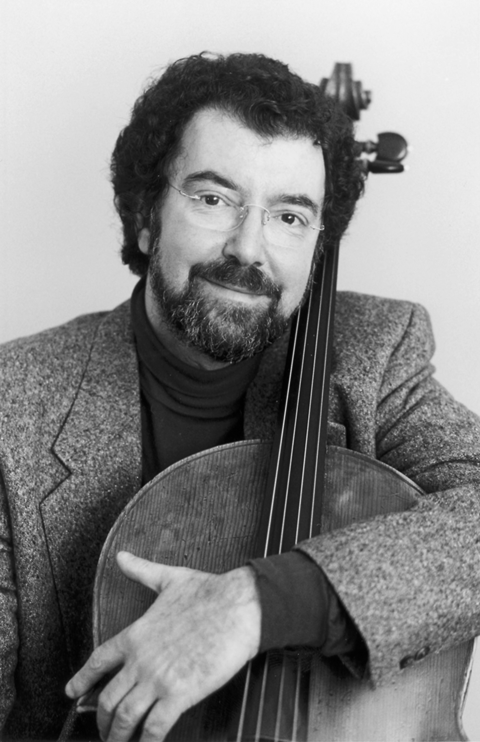Boris Pergamenschikow prizes his teachers for their emphasis on gradual learning, in this interview from the September 2000 issue of The Strad

Read our April 2024 feature ’The life and legacy of cellist Boris Pergamenschikow’ here
My father, who was a cellist, was the first person who showed me how to hold the instrument and the bow. My first real lessons, however, were with a well-known cellist in Leningrad when I was six: here I began to learn the right way to put the fingers on the string, concentrating simply on a basic technique. Soon afterwards I entered a typical Soviet music school where my teacher was Benjamin Morozov. He was the principal cellist of the Leningrad Philharmonic, a very fine musician who worked with me on the production of a good sound, but without fostering any ambitions. I’m not sure why that was: maybe I was less interested in the cello than other students, or maybe I wasn’t technically gifted enough! When I was twelve, Morozov left the school and I went instead to Emmanuel Fischmann, with whom I studied for the next twelve years, continuing with him at the Leningrad Conservatory after music school.
His teaching was not at all didactic - I’m not sure he would have known how to be didactic! He had a brilliant intuition and always kept in mind beauty of sound and good taste. Although he was strict, always wanting us to practise more, everything he said was full of love. In a way he was like a second father to me.
His teaching was very fundamental: he worked on beauty of sound, the different types of vibrato and set many scales and studies. I was given studies by Duport and Dotzauer and small pieces - not ‘real’ music, no Bach at that age and concertos by Davidov or Romberg rather than the big names. I think this was sensible because it did not risk spoiling the great music like Schumann and Haydn by using it as an etude. I didn’t try to explore the repertoire on my own because I had such respect for my teacher: I was afraid to make mistakes which could be harmful in the future. The repertoire was very limited until I was 12 or 13, but this was good because we learnt to find the best music among composers who were not so famous. I only began to study Bach at 14 or 15, and even then we concentrated more on the concertos, such as Davidov. Only at about 16 did I start to learn the small Haydn concerto and then very slowly the rest of the regular repertoire.
Fischmann did not suggest any mental exercises away from the cello and, regarding practising, his advice was not so specific. He would tell me to practise slowly or without vibrato, or to work on a certain bar, but he didn’t make exercises out of the music. I think the simplicity of his teaching was excellent because kids could understand him much better than somebody who expresses himself in a more sophisticated way. Sometimes we used to laugh because his language and advice were almost too simple! Everything he said was sensible, however. He advised, for example, that when playing in a concert hall we should think about the back row of the audience, not the front, to encourage us to project the sound; he asked us to avoid slides up the fingerboard; he gave us a good general sense of beauty and taste.
Lessons were always individual - there was no time at school for listening to other students. I would have my lessons at 5pm on Tuesdays and Fridays and then I would go, because I was so busy. It was a difficult schedule: we had an enormous number of classes each day in the usual school subjects, plus choir, orchestra, harmony, solfège, composition, chamber music and piano - and we still had to practise. I studied composition and the piano perhaps more than the other cello students - on the piano I could eventually play a Beethoven concerto and pieces by Scriabin and Debussy. Studying the piano was very helpful. I could learn how to shape and entire piece of polyphonic music, rather than just the single cello line. Also, many great composers, such as Bach, Mozart and Schumann wrote piano music for children of ten or eleven, so at that age I could have a connection with the great composers.
Looking back 40 years, I greatly admire Fischmann’s ability to teach very simply and give a good education to so many cellists. Mischa Maisky was one of them, and while not all his students became soloists, many of them are now professionals in France, The Netherlands, Israel and all over the world.
INTERVIEW BY JESSICA DUCHEN
Read: Practice Diary: cellist Hannah Roberts
Read: Technique: the connections between cello and voice
Read more Featured Stories like this in The Strad Playing Hub
The number one source for playing and teaching books, guides, CDs, calendars and back issues of the magazine.
In The Best of Technique you’ll discover the top playing tips of the world’s leading string players and teachers. It’s packed full of exercises for students, plus examples from the standard repertoire to show you how to integrate the technique into your playing.
The Strad’s Masterclass series brings together the finest string players with some of the greatest string works ever written. Always one of our most popular sections, Masterclass has been an invaluable aid to aspiring soloists, chamber musicians and string teachers since the 1990s.
American collector David L. Fulton amassed one of the 20th century’s finest collections of stringed instruments. This year’s calendar pays tribute to some of these priceless treasures, including Yehudi Menuhin’s celebrated ‘Lord Wilton’ Guarneri, the Carlo Bergonzi once played by Fritz Kreisler, and four instruments by Antonio Stradivari.













































No comments yet